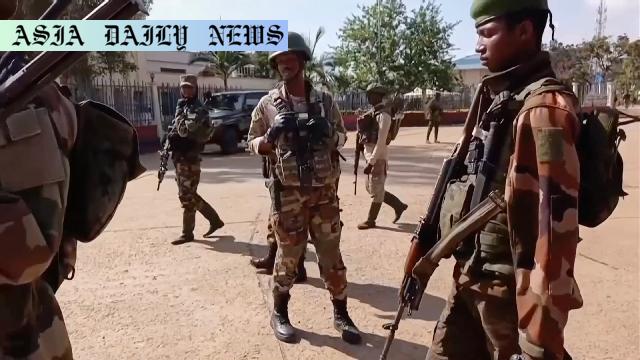M23 Rebels: Anti-government militants reportedly took control of Bukavu in Eastern DRC, further intensifying the ongoing conflict.
- M23 Rebels seized Bukavu, a major city in eastern DRC.
- DRC troops fled, leaving citizens feeling betrayed.
- Reports of child casualties as local children attempted to retrieve weapons left behind by government forces.
- M23 Rebels are allegedly supported by neighboring Rwanda.
- The takeover follows increased attacks and the recent capture of Goma.
- Longstanding political instability and external interference exacerbate the region’s issues.

An Overview of the Recent Takeover
The Democratic Republic of the Congo (DRC) is facing another chapter of instability as the Rwandan-backed M23 rebel group has seized control of Bukavu, a significant city in the country’s eastern region. On Sunday, reports emerged that anti-government forces had entered Bukavu, meeting little resistance as DRC troops abandoned their posts. For the residents of Bukavu, this takeover symbolizes a failure of their national government to provide protection, leaving the populace with feelings of betrayal and despair.
The Human Impact of the Crisis
Heartbreaking reports reveal that some local children, in a desperate attempt to arm themselves with abandoned weapons, were met with violence by the M23 fighters. Tragically, several were killed in the ensuing conflict. A video shared by an NGO worker’s relative showcases children in ill-fitting government uniforms scavenging for equipment left behind. This tragic loss of young lives underscores the dire consequences of a government ill-prepared to defend its territories.
The M23 Rebels and Their Alleged Backers
Credible accusations have pointed the finger toward Rwanda, claiming that its government is supplying support to the M23. This is not the first time Rwanda has been accused of influencing the conflict in the DRC. The M23, which has grown steadily more aggressive since early this year, recently captured Goma, another pivotal city in the region. Their campaign has sharply escalated tensions between the DRC and Rwanda, with the DRC openly condemning the involvement of Rwandan troops.
Background on the DRC’s Political Turmoil
The roots of the DRC’s current state of instability can be traced back to its independence from Belgium in 1960. Decades of political chaos have led to ongoing violence and civil wars, with external nations often interfering in the region’s domestic matters. Between 1996 and the early 2000s, two civil wars devastated the nation, killing an estimated six million people from violence, starvation, and disease. At the core of this crisis is the country’s wealth of natural resources, which has long been both a blessing and a curse for its citizens.
The Role of Natural Resources
The DRC is rich in minerals, including cobalt, gold, and diamonds, which pique the interests of both multinational corporations and neighboring nations. This wealth, while offering potential prosperity, has instead fueled exploitation, corruption, and proxy wars. With foreign nations backing rebel groups like the M23, the DRC remains a battleground for control over its precious resources. These riches, ironically, have plunged the country deeper into instability as multiple groups vie for dominance.
A Call for International Intervention
The current situation underscores an urgent need for both regional and international intervention. As Bukavu falls to the rebels, the safety of millions remains at risk. Humanitarian organizations must be allowed to access the region to aid civilians, while diplomatic efforts to resolve tensions between Rwanda and the DRC are paramount. Any lasting solution must address underlying issues such as the exploitation of natural resources and the lack of reliable governance in the conflict zones.
Conclusion
The capture of Bukavu by M23 rebels marks another bleak milestone in the DRC’s history of conflict. With civilians left defenseless, children caught in the crossfire, and accusations of foreign interference mounting, the need for a path toward peace has never been more critical. Addressing the root causes of the crisis, including corruption, external meddling, and the exploitation of resources, will be vital in building a stable and equitable future for the DRC and its citizens. Until then, the region remains in turmoil, awaiting the international community’s support and accountability.



Commentary
The Growing Crisis in the DRC
The recent events in Bukavu highlight the tragic and ongoing struggles of the DRC. For decades, this beautiful and resource-rich country has been burdened with political instability and violence, often fueled by external interference. The fall of Bukavu to the M23 rebels not only illustrates the severity of the current crisis but also underscores a broader issue of governmental dysfunction and regional power struggles.
The Human Cost of Conflict
One cannot help but feel a deep sense of sadness and frustration over the loss of young lives in Bukavu. The image of children scavenging for weapons left behind by fleeing soldiers is both heartbreaking and alarming. It demonstrates a complete failure to protect the most vulnerable—a generational tragedy that will have repercussions for years to come. These are not just isolated events; they are symbolic of a system that continues to fail its people.
Urgency for Collective Action
There is no simple solution to the crisis in eastern DRC. However, this does not mean that the world can turn a blind eye. Regional powers, the African Union, and the international community have a responsibility to step forward and put an end to this cycle of violence. The DRC deserves more than to be a battleground for greed and geopolitics. Its people deserve peace, security, and opportunities to thrive.
As observers, we are often left feeling powerless. But raising awareness of these issues, pressuring policymakers, and supporting humanitarian efforts are ways in which we can contribute. The DRC’s plight is a reminder that the cost of inaction—on both local and global levels—is far too high.